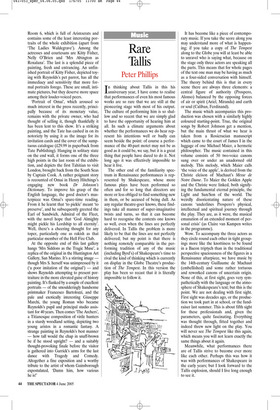Rare Tallis
Peter Phillips
In thinking about Tallis in this his anniversary year, I have come to realise that performances of even his most famous works are so rare that we are still at the pioneering stage with most of his output. The culture of performing him is so shallow and so recent that we are simply glad to have the opportunity of hearing him at all. In such a climate arguments about whether the performances we do hear represent his intentions well or badly can seem beside the point: of course a performance of the 40-part motet may not be as good as it could be, we say, but it is a great thing that people have dared to do it. Not long ago it was effectively impossible to hear it live.
The other end of the familiarity spectrum in Renaissance performances is represented by Shakespeare, whose more famous plays have been performed so often and for so long that directors are more or less obliged to find something new in them, or be accused of being dull. As any regular theatre-goer knows, these findings take all manner of super-imaginative twists and turns, so that it can become hard to recognise the contexts one knows so well, even when the lines are perfectly delivered. In Tallis the problem is more likely to be that the lines are not perfectly delivered; but my point is that there is nothing remotely comparable in the performing tradition of any of the music (including Byrd’s) of Shakespeare’s time to rival the kind of thinking which is currently on display in the Globe Theatre’s production of The Tempest. In this version the play has been so recast that it is literally impossible to follow it. It has become like a piece of contemporary music. If you take the score along you may understand more of what is happening; if you take a copy of The Tempest along to the Globe you will at least be able to unravel who is saying what, because on the stage only three actors are speaking all the parts. This means that for whole pages of the text one man may be having as much as a four-sided conversation with himself. The theory behind this is that in every scene there are always three elements: a central figure of authority (Prospero, Alonso) balanced by the opposing forces of air or spirit (Ariel, Miranda) and earth or soul (Caliban, Ferdinand).
The music which accompanies this production was chosen with a similarly highly coloured starting-point. True, the original songs by Robert Johnson get a mention, but the main thrust of what we hear is taken from a Rosicrucian manuscript which came to the court of James I in the luggage of one Michael Maier, a hermetic philosopher. The music contained in this volume consists of 50 two-voice canons sung over or under an unadorned old melody. This melody, which Maier calls ‘the voice of the apple’, is derived from the Christe eleison of Machaut’s Messe de Notre Dame. To Maier the Golden Apple and the Christe were linked, both signifying the fundamental eternal principle, the Light and Sun/Son of the world. The weirdly disorientating nature of these canons ‘underlines Prospero’s physical, intellectual and spiritual journey through the play. They are, as it were, the musical emanation of an extended moment of personal crisis’ (as Claire van Kampen writes in the programme).
Wow. To accompany the three actors as they circle round each other in tight groupings more like the knottiness to be found in a Bacon triptych than in the traditional perspective spaciousness of the figures in a Renaissance altarpiece, we have music by the 14th-century Guillaume de Machaut (embellished) and some rather tortuous and reworked canons of uncertain origin. None of this, at first sight, goes very sympathetically with the language or the atmosphere of Shakespeare’s text; but this is the point. We are not dealing with first sight. First sight was decades ago, or the production we took part in at school, or the fundraiser last summer. This is about fifth sight for these professionals and, given the parameters, quite fascinating. Everything was thought through, fitted together and indeed threw new light on the play. You will never see The Tempest like this again, which means you will not learn exactly the same things about it again.
Meanwhile, what performances there are of Tallis strive to become ever more like each other. Perhaps this was how it was with performances of Shakespeare in the early years; but I look forward to the Tallis explosion, should I live long enough to see it.


















































 Previous page
Previous page